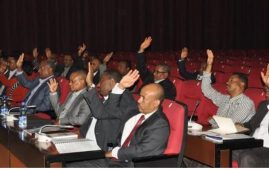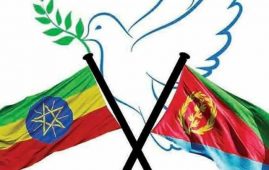Highlights:
* It’s a carefully crafted example of Human Rights Watch’s poor methodology, its techniques of deliberately misusing facts or misinterpreting them to suit its own claims, and of inventing elements in common with the worst of the journalistic exaggerations of the tabloid press. To start with the first line of the article, Meles, who is actually recovering not ailing, is not Ethiopia’s president but its Prime Minister.
* To paraphrase Mr. Rawlence, there are many in Ethiopia who wish that Brussels was paying more attention to what Human Rights Watch is up to with its so-called reporting.
Examples of poor research and manipulation of facts, deliberate or otherwise, can all-too-often be seen in the work of international advocacy organizations which prefer invention to accuracy, fiction to fact. One recent example can be seen in a piece produced by Ben Rawlence, senior researcher on Africa for Human Rights Watch (HRW), a few days ago. (Why are Ethiopian eyes on Brussels? 19.7.2012). This was an article clearly intended to try to influence the European Union to cut aid to Ethiopia by making allegations about what Mr. Rawlence calls the “abusive policies being pursued by Ethiopia’s ailing president.”
It’s a carefully crafted example of Human Rights Watch’s poor methodology, its techniques of deliberately misusing facts or misinterpreting them to suit its own claims, and of inventing elements in common with the worst of the journalistic exaggerations of the tabloid press. To start with the first line of the article, Meles, who is actually recovering not ailing, is not Ethiopia’s president but its Prime Minister.
This rather obvious error sets the tone and is symptomatic of Mr. Rawlence’s casual, indeed, cavalier approach to both accuracy and evidence. He claims, for example, that two Swedish journalists convicted in December 2011 were jailed for terrorist-related offences. That’s only partially true. They were convicted for crossing into Ethiopia illegally, as well as for travelling with an armed group of the Ogaden National Liberation Front, a terrorist organization, as indeed they admitted. According to their own testimony, the two were not actually attempting “to report on the closed Ogaden region where rights abuses against the indigenous Somali population are rampant”: they themselves said they were trying to investigate the activities of a Swedish oil company.
It might be added that “the Ogaden region”, is not closed; it is only HRW quoting members of the Eritrean-backed Ogaden National Liberation Front, a terrorist organization, which claims “rampant” human rights abuses; the regional state government, actually freely elected by the “indigenous Somali population” currently presides over substantial development in the region and operates highly successful policies dealing with last year’s drought; the Ethiopian government is actively engaged in discussions with the ONLF to encourage it to lay down its arms as one major faction did last year, and another group, the United Western Somali Liberation Front, did a year earlier. None of these are details that Mr. Rawlence sees fit to mention. Nor is he prepared to itemize from where he and HRW collect their information, neglecting to mention that it is actually from outside the country and in many, if not all, cases from members and supporters of the ONLF.
Mr. Rawlence goes on to refer to villagization in Gambella, repeating an earlier Human Rights Watch claim that “the government has already removed thousands of indigenous people from their homes against their will and re-settled them in new areas which are often infertile and lack schools and clinics.” This again is simply not true, and Mr. Rawlence deliberately neglects to mention that a whole series of investigations by other organizations have failed to find any of the “evidence” that Human Rights Watch has claimed. Investigations by the Donor Assistance Group, as well as repeated visits by embassies including several members of the European Community, the UK and the US, and by a raft of NGOs working in the area have all failed to substantiate Human Rights Watch claims – which are as usual drawn largely, if not exclusively, from people outside the country, members of externally-based armed opposition movements and other dissidents.
The same problems arise over Human Rights Watch claims over the sugar project in the Omo Valley. Mr. Rawlence says this made “no pretence of consulting local indigenous communities before removing people from their land”. This again is simply untrue as is the HRW claim that the sugar plantations “are being developed without the environmental and social impact assessments that are required by Ethiopian law.” Environmental and social impact studies have been carried out for the sugar developments, just as they have for the Gilgel Gibe III dam, another project criticized by HRW, and for its impact on the Lower Omo Valley. Despite Mr. Rawlence’s attempts at sarcasm, the Federal Government of Ethiopia is fully aware of its own constitution, and of the African Charter, the UN Declaration of the rights of Indigenous Peoples and similar declarations to which it is signed up, and of the fact that people, indigenous or otherwise, should not be displaced without free, prior and informed consent.
In fact, in all these cases, despite HRW’s allegations, the government, and contractors where appropriate, have carried out environmental and social impact studies; they have consulted the local populations; they have removed no one against their will; and they have provided facilities at the new sites including roads, schools, clinics and other facilities, though admittedly there have been some delays in certain areas. The developments include substantial infrastructural improvements to the areas involved as well as extensive job creation and other benefits. It might also be noted that people who choose to move also have the right to return to their previous home areas at any stage over the following three years.
Mr. Rawlence, and Human Rights Watch, do not see fit to mention any of this or bother to note the extensive and very detailed refutations that have been made of Human Rights Watch’s allegations. They have, in fact, made no effort to address the evidence that is actually visible and available on the ground.
Mr. Rawlence makes no effort to try and reply to the detailed criticisms of HRW’s methodology that have been repeatedly made in recent years, in some cases by HRW’s own members including indeed its own Chairman Emeritus. Human Rights Watch, regrettably, has a habit of never admitting to errors however gross or obvious, or of apologizing for mistakes however serious the effect might be on the people it claims to be trying to assist. To paraphrase Mr. Rawlence, there are many in Ethiopia who wish that Brussels was paying more attention to what Human Rights Watch is up to with its so-called reporting.
* Originally published on A Week in the Horn, July 27, 2012 issue, titled “Human Rights Watch can’t even be bothered to
get Meles Zenawi’s position right”.
***************
Check the Meles Zenawi archive or the Human Rights archive for related posts.






tumayota, Is that all you can share with us! Ethiopia is better of with Weyane leadership.
Who try to abuse humanright report is I know the Woyanne Cadre. Go back to Ethiopia History what was happened to Orom & South Ethiopia people during Minelik? What was happend to Wollo people during Hailesilase? what was happened to Tigria People During Derg regem? You try to deny Genocide carried out to Gambella, Ogaden, Afar, Sidama,Oromia… Poeple at this moment by woyanne,TPLF. How many peoples killed by Agaz Militia In Adiss in 2005. However, the doomsday will come soon to Woyanne. Then everybody including you condemmen this regem and appreciate humahright activists. GOD BLESS ETHIOPIA.